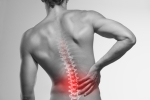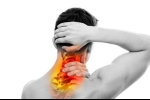Home »
Blog » Back Pain
| Stem Cell, PRP, Acupuncture in Queens & Long Island, New York
Back Pain | Stem Cell, PRP, Acupuncture in Queens & Long Island, New York
Tags: Back Pain | Posted on: 07-Oct-2019 | No of views: 3622 The Truth About Back Pain - It might be a sharp stab. It might be a dull ache. Sooner or later, 8 out of 10 of us will have back pain. And back pain myths are almost as common. Let's set the record straight about what you may have heard.
Myth: Always Sit Up Straight - Slouching is bad. But sitting up too straight and still for long periods can also be a strain on your back. Take breaks a few times a day: Lean back in your chair with your feet on the floor and let your back curve slightly. Even better: Try standing for part of the day, perhaps while you're on the phone or reading.
Read more
Tags: Back Pain | Posted on: 05-Oct-2019 | No of views: 3444 The marvelous strength and flexibility that's engineered into your lower back also make it susceptible to developing lots of problems. And because of the many nerves that run throughout the spine and into the rest of your body, a problem in the lower back can lead to leg pain, hip problems and more.
Why is Your Lower Back So Prone to Injury?
The lower back is subject to injury while lifting a heavy object, twisting, or a sudden movement—any of which can cause muscles or ligaments to stretch or develop microscopic tears. Over time, poor posture or repetitive stress can also lease to muscle strain or other soft tissue problems.
Read more
Tags: Back Pain | Posted on: 30-Sep-2019 | No of views: 3726 When back pain won’t go away, your doctor will consider all the treatments that could help you, from exercise and physical therapy to medication. Part of that may include injections to ease your back pain and inflammation. These shots usually consist of a steroid and a numbing medicine. Keep in mind that while these shots help some people, not everyone gets the same relief.
Read more
Tags: Back Pain | Posted on: 27-Sep-2019 | No of views: 4643 You may get different answers to this question, depending on who you ask. It is true that herniated disc symptoms can subside over time even without medical intervention. But does that mean the herniated disc has healed on its own? As with so many things, the answer is incomplete. Yes, your symptoms may resolve, but this does not necessarily mean the herniated disc itself has healed.
Read more
Tags: Back Pain | Posted on: 20-Sep-2019 | No of views: 4222 Spinal anatomy is a remarkably intricate structure of strong bones, flexible ligaments and tendons, extensive muscles, and highly sensitive nerves and nerve roots. We often don't think about their form and function, though, until they become a source of pain. Without question, the composition and function of the spine is a marvel of nature, providing us with a unique combination of:
1. Protection for the spinal cord and nerve roots to safely relay messages to and from the brain and the rest of the body. 2 Shock absorption, accepting jolts and stress as we move about 3 Flexibility, especially in the lower back and neck, allowing us to bend and twist in a full variety of movements 4. The strength provided by the bones, discs, joints, and supporting muscles and connective tissue that allows us to stand upright and move about with precision
Read more
Tags: Back Pain | Posted on: 13-Sep-2019 | No of views: 3372 When back pain is caused by a spinal disc problem, the source of the pain is either from a nerve being irritated by a protruding disc, or it is from the disc space itself. Differentiating between the two can cause confusion among patients, as doctors may use a variety of terms to describe the problem—such as a slipped disc, pinched nerve, and degenerated disc. To help clarify disc problems, on this site we focus on identifying the source of the pain as coming from either a pinched nerve or a degenerated disc.
Read more
Tags: Back Pain | Posted on: 26-Aug-2019 | No of views: 3522 When a friend with bad back pain asks me where to get help, I respond that personally, I would start with getting a diagnosis from a physiatrist who specializes in back pain. Here is why:
I like the general orientation of physiatry, which is to provide enough pain management to enable patients to make progress with physical therapy and rehabilitation—which is often the best long-term solution. Practitioners in other specialties may also have this focus, but my impression is that physiatrists are most likely to have this focus.
Read more
Tags: Back Pain | Posted on: 15-Aug-2019 | No of views: 3770 For most people suffering from back pain, surgery is scheduled only after all other options have been exhausted. One non-surgical approach to pain relief is epidural steroid injections. They are only intended for temporary pain relief, but steroid injections coupled with therapeutic exercise may allow patients to postpone or even avoid surgery altogether. Epidural steroid injections are most often used to treat low back and leg pain associated with sciatica, which is pain caused by a pinched nerve in the low back that radiates down the leg.
Read more
Tags: Back Pain | Posted on: 02-Aug-2019 | No of views: 4653 Did you know a desk job could be hazardous to your health? Sitting too much emerged as a serious health issue in the U.S. last year. Instead of sitting all day, consider alternating standing and sitting at work. Many new adjustable desks make this easier than ever. While you are seated, make sure you are doing all you can to ensure the health of your spine.
Read more
Tags: Back Pain | Posted on: 27-Jul-2019 | No of views: 3796 First aid for episodes of back and neck pain can work surprisingly well. Here are some of the most effective first aid treatments you can try at home. Pain medication - Two main types of medications can be very helpful for relieving many types of back pain: acetaminophen and non-steroidal anti-inflammatory drugs (NSAIDs).
Read more
Love this Post? Spread the World






















